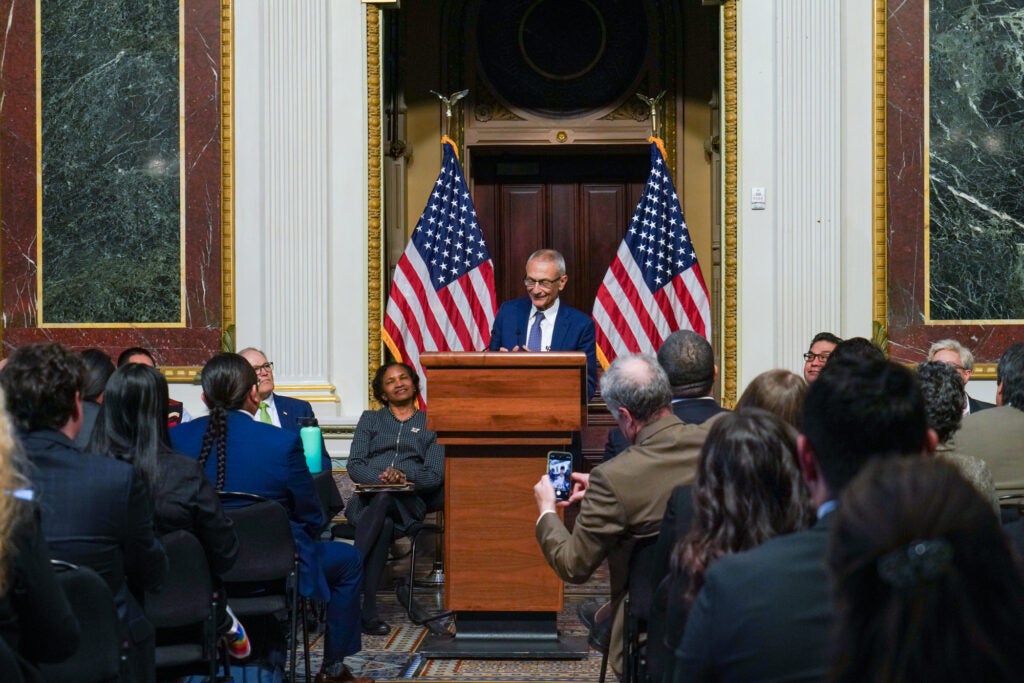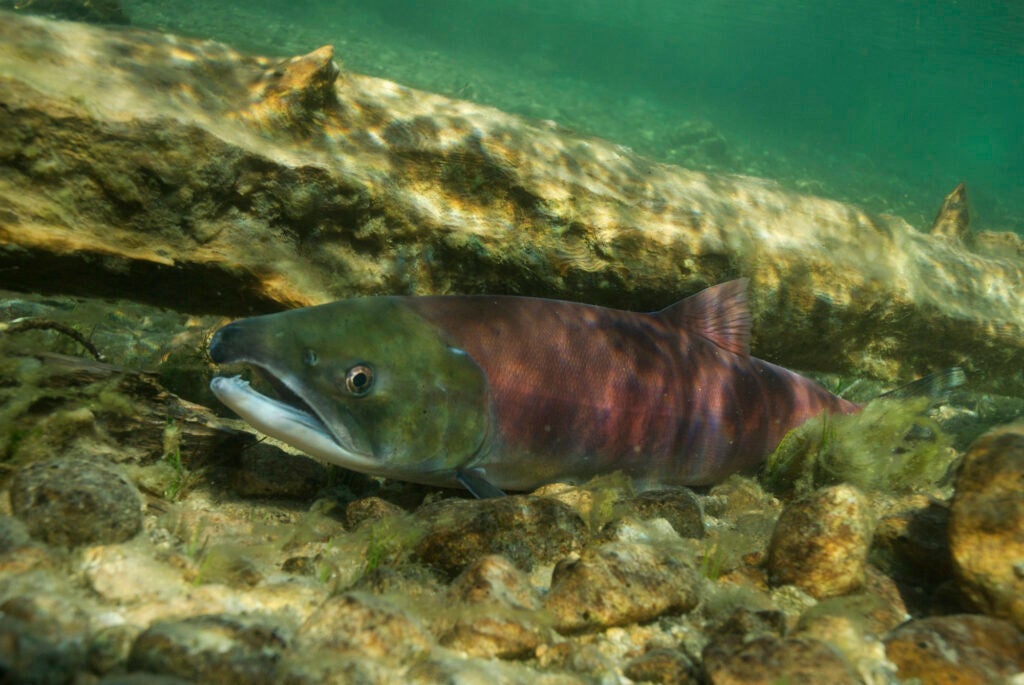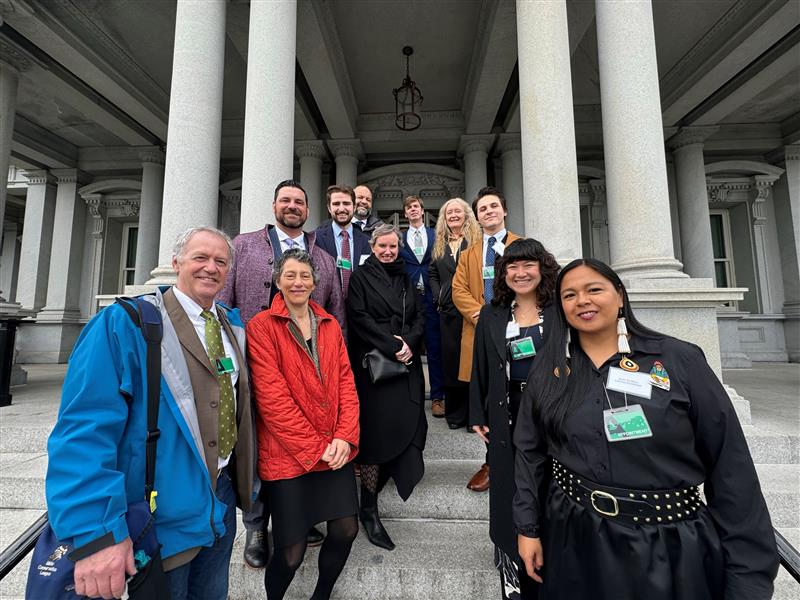Charting a Path Forward to Recover Salmon in the Columbia River Basin
A ceremonial signing at the White House in February honored decades of hard work and solidified partnerships to recover salmon while pointing to significant work that lays ahead.
In late February, federal officials and representatives from six sovereign governments – leaders from the Nez Perce, Yakama, Warm Springs and Umatilla Tribes and the governors of Washington and Oregon – gathered at the White House for a ceremonial signing of the historic Columbia River Basin Agreement.
The momentous event included speeches from leaders for each of the six sovereigns and key federal officials including Brenda Mallory, Chair of the Council on Environmental Quality, and John Podesta, Senior Advisor to the President for Clean Energy Innovation and Implementation. Earthjustice, our clients, and Earthjustice President Abbie Dillen were proud to be in attendance to celebrate the agreement alongside the sovereigns and administration officials. A recording of the ceremony is also available online for those who were not able to tune in live.
The ceremony commemorated the historic agreement that will advance salmon recovery in the Basin, plan to replace the services of the Lower Snake River dams and invest in the Northwest. But the speakers also made clear that there is still much more work that remains ahead, and that accomplishing that work will depend upon strong partnerships between the parties as well as good-faith engagement from relevant stakeholders.
“This is only the beginning,” said John Podesta, who called the agreement “a set of solemn mutual commitments, ones we worked very hard to create.”

John Podesta, Senior Advisor to the President for Clean Energy Innovation and Implementation. Earthjustice, at the White House ceremony celebrating the Columbia River Basin Agreement. (DOI)
The agreement signed at the White House on Feb. 23 was first announced on Dec. 14, 2023. It commits federal agencies to implement a set of U.S. government commitments consistent with a Presidential Memorandum signed by President Biden in September and in partnership with the six sovereigns and other stakeholders throughout the region.
Collectively, the commitments provide more than $1 billion in federal funding to begin implementation of the Columbia Basin Restoration Initiative, a Tribal-state plan developed by the four Lower Columbia River Treaty Tribes and the states of Washington and Oregon to restore wild salmon and other native fish populations in the Snake and Columbia River Basins to a healthy and harvestable abundance.
With salmon on the brink of extinction, this is the comprehensive approach that we need. We are grateful for the leadership of the six sovereigns and to the Biden administration for helping us chart this new path forward.

Sockeye salmon in Little Redfish Lake Creek, a tributary of the Snake River. (Neil Ever Osborne / Save Our Wild Salmon)
Several months have passed since the agreement was announced and we have continued to see progress at both the federal and state levels to advance salmon recovery in the Basin:
- The signing ceremony on February 23 demonstrated a whole-of-government commitment to this agreement from agencies across the administration. But Congress also has a critical role in this effort including authorizing recovery actions and appropriating funding for them. In the months since the Agreement was announced, members of Congress in both Washington and Oregon have expressed strong support for the agreement, including Sen. Murray, Sen. Merkley, Rep. Jayapal and Rep. Smith. The leadership of these members and others will be key as we work to implement and build upon the agreement.
- At the same time, the State of Washington has continued to dedicate resources for efforts to help inform future actions in the Columbia-Snake River Basin. The Washington Legislature appropriated $600,000 in its 2024-2025 Supplemental Operating Budget (SB 5950) to identify and study recreational and conservation opportunities on the lower Snake River in advance of any future federal decision to authorize breaching of the four federal lower Snake River dams. The new recreation study joins a set of similar studies funded by the Legislature last year to inform governing bodies and the public on infrastructure updates that could maintain and further develop energy, irrigation, and transportation options if breaching were to occur.
As John Podesta said during the ceremony, “this is only the beginning.” Here are some of the key next steps that we are watching for in the months to come:
- President Biden proposed significant funding increases to honor commitments to Tribal Nations and support Columbia Basin salmon populations in his FY25 President’s Budget Request. We are urging members of Congress to ensure this funding is included in the appropriations bills that will be drafted in the coming months. Joint federal-state studies to evaluate how to replace and improve upon the energy, transportation, irrigation, and recreation services provided by the lower Snake River dams are now beginning. Public engagement from a broad variety of stakeholders will be critical as the agencies work to incorporate the best available data, backed by science and informed by regional and national expertise, into these planning documents.
- A federal-state 10-year fish needs plan is scheduled to be completed this summer. The plan will identify key actions, in addition to the ones already included in the agreement, that are necessary to advance the recovery of healthy and abundant Columbia Basin fisheries, consistent with the Presidential Memorandum. This plan will also help inform additional funding needed to restore salmon and other native fish across the Basin in the years to come.
We have a unique opportunity — and responsibility — to recover healthy and abundant salmon throughout the Columbia River Basin while investing in a more resilient and modernized Northwest economy. Doing so will not only bring back these incredible fish and promote the region’s ecological and economic health, but it will also help finally meet long unmet promises to the Lower Columbia River Treaty Tribes who reserved the right to fish in perpetuity in their treaties with the United States Government.
With the leadership of the Six Sovereigns and the support of the Biden Administration, we can begin to make this comprehensive vision a reality.
Established in 1989, Earthjustice's Policy & Legislation team works with champions in Congress to craft legislation that supports and extends our legal gains.
Geoffrey Nolan
Public Affairs and Communications Officer, Earthjustice
gnolan@earthjustice.org
